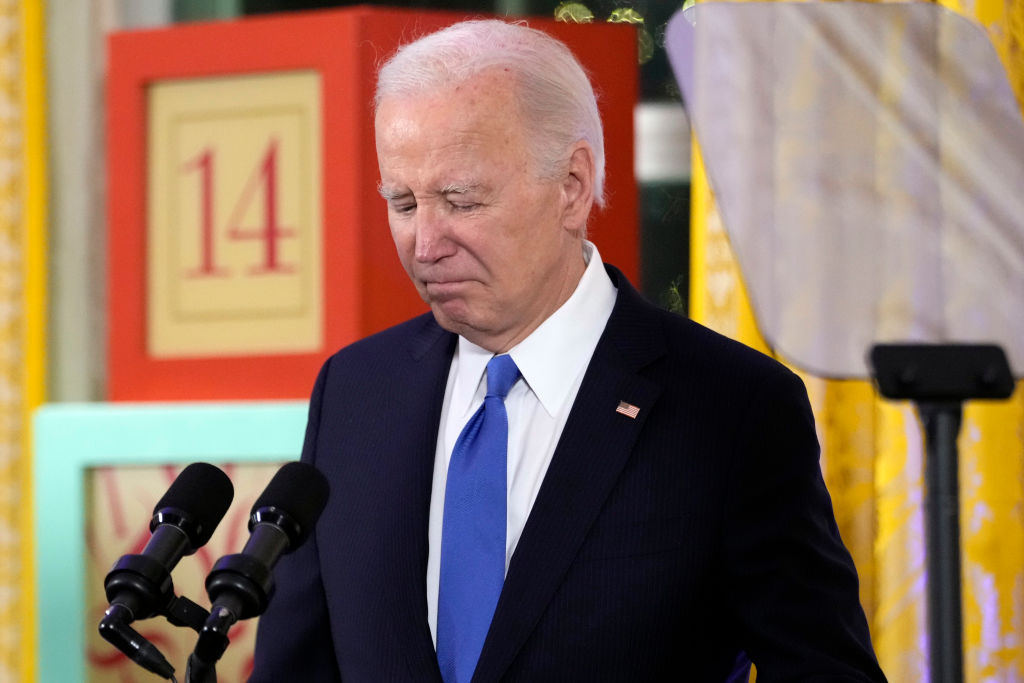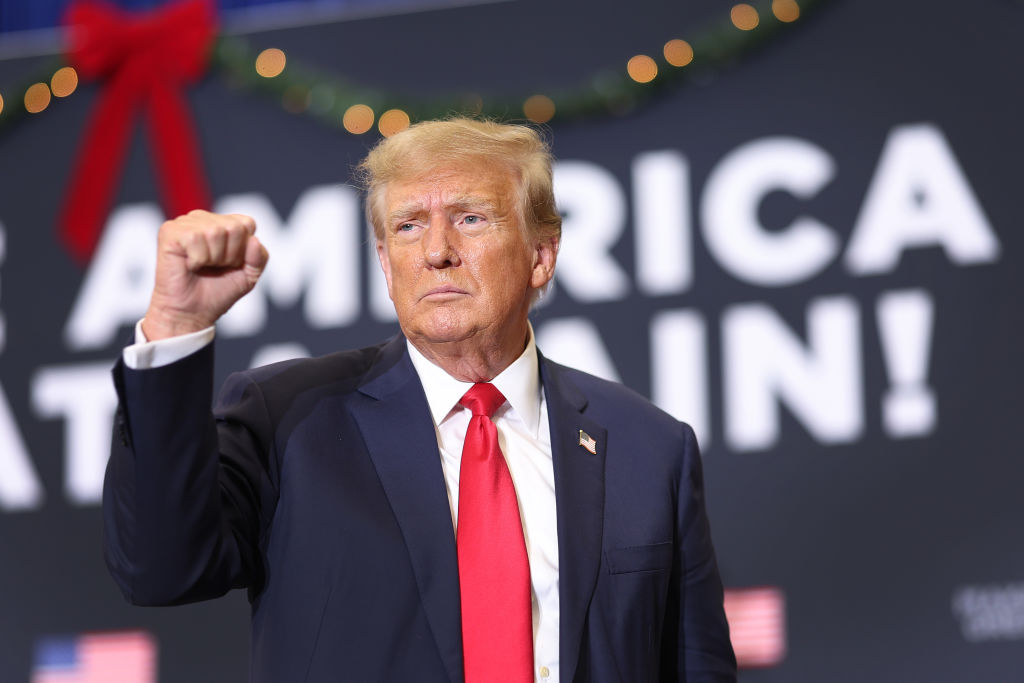“Democracy,” wrote H.L. Mencken, “is the theory that the common people know what they want, and deserve to get it good and hard.” The 2024 presidential primaries are shaping up to be no different. The fat lady may not have sung quite yet, but she has put on her dress, applied her makeup, and warmed up her vocal chords, and is currently waiting in the wings just off-stage. One way or another, the voters are going to get what they want — good and hard.
On the Democratic Party’s side of the equation, the presidential primary was largely over before it began. While Joe Biden’s increasing resemblance to a vegetable may have been a good argument for retiring him to a nursing home at the conclusion of his first term, parties don’t tend to replace their incumbent presidents on the ticket. (With a few notable exceptions).
Despite a brief, transitory burst of media interest in a billionaire-funded vanity campaign to unseat Biden from Democratic congressman Dean Phillips, the president is, for all intents and purposes, his party’s presumptive nominee.
In the Republican primary, Nikki Haley remains the last standing challenger to Donald Trump, and nobody save for a handful of overpaid consultants believes that her campaign is long for this world.
By Super Tuesday or shortly thereafter, Haley will have to come face to face with the fact that Republican voters don’t share her bottomless appetite for sending their tax dollars to the Donbas, nor her enthusiasm for quippy girlboss feminism. Whenever that time arrives — and it will arrive soon — Trump will sail to the Republican presidential nomination for the third consecutive cycle.
Thus, a 2024 rematch between Donald Trump and Joe Biden appears all but certain. But that hasn’t stopped a handful of third-party challengers from throwing their hats in the ring: Robert F. Kennedy, Jr., nephew of President John F. Kennedy, is perhaps the most well-known of these extra-partisan challengers, campaigning on a sort of heterodox genre of conservative-liberal populism.
But there are also challengers from the Left, including the academic-activist Cornel West and perennial Green Party candidate Jill Stein; and even the prospect of a centrist challenge from a candidate selected by the moderate group No Labels, which purports to represent a coalition of disaffected establishment Democrats and Never Trump Republicans.
The rationale for a third-party bid is based on two core premises: First, that American voters are unenthusiastic about a Biden-Trump rematch; and second, that the electorate’s exhaustion with the two major party candidates would make them unusually amenable to someone from outside the partisan duopoly.
There is some data to bolster those claims: The American voting population’s aversion to the prospect of a Biden-Trump redux has been consistently expressed in public opinion polls, and a USA Today/Suffolk University poll at the end of December showed a generic third-party candidate winning an unusually strong 17 percent of the vote.
But polled support for a generic, unnamed third-party candidate could just as likely be a placeholder for voter discontent as it could a prediction of actual voting behavior.
Enthusiasm for an abstract third-party challenger does not always translate into enthusiasm for the particular third-party candidates who happen to be running, and the phenomenon of voters “coming home” to their preferred major party in the final stretches of elections — eventually giving in to their partisan loyalties, in spite of concerns they might harbor about a given candidate — is a real and consistently documented phenomenon.
The idea that any of the announced or potentially-to-announce independent presidential hopefuls could actually win in 2024 is unlikely, given both the limited appeal of the candidates themselves and the hegemonic nature of America’s two-party system. But in a closely-divided country, where even nationwide elections are often decided by razor-thin margins in a handful of states, it’s entirely possible that they could serve as spoilers for either Biden or Trump’s White House ambitions.
Which of the two major campaigns these third-party bids spoil remains an open question. As the most competitive third-party candidate in the polls — garnering 10 per cent in the recent Suffolk University/USA Today survey — Robert F. Kennedy, Jr. presents the most potent threat to Trump.
Contrary to what one might assume, given Kennedy’s history as a lifelong Democrat (and his initial effort to run against Biden in the Democratic primary, before defecting to run as an independent), numerous polls show Kennedy siphoning away more votes from Trump than from Biden.
That tracks with the substance of Kennedy’s public profile and platform: The 70-year-old made a name for himself as a vaccine skeptic and a fierce critic of Covid lockdowns, and evinces a skepticism of censorship, corporate power and the security state that would have been comfortably at home in the left of the 1960s, but is today more native to the right.
Stein and West garner considerably smaller shares of the vote than Kennedy. A number of polls over the past few months have shown Stein hovering between 1 and 2 per cent, and West between 2 and 3.
But the one-two punch of their combined support could easily kneecap Biden in critical swing states, particularly given that Stein and West are courting traditionally Democratic constituencies that Biden is struggling with: Young voters, progressives, nonwhites, and other left-wingers who are dissatisfied with Biden’s support for Israel’s military operation in Gaza. (A position that has already caused a revolt from the party’s Left flank — including within the White House itself).
Stein and West are both campaigning not just as staunch progressives, but as avowed critics of Israel — particularly in the context of its actions since October 7. While the constituencies that they hope to woo might be marginal relative to the overall electorate, it could nonetheless serve as a poison pill for Biden in key areas.
Arab and Muslim voters, for example, are a small fraction of the American voting population, but they are overrepresented in critical swing states like Arizona, Georgia, and Michigan — and fiercely opposed to Biden’s handling of Israel-Palestine. In 2020, the Arab American Institute found that 59 percent of Arabs voted for Biden. In late October, the same group found that the demographic’s support for Biden had plummeted to just 17 percent — a breathtaking 42-point drop.
As for No Labels, it’s anyone’s guess as to which side they’ll help or hurt — or even if they’ll opt to enter the race at all. “The group, founded by former Democratic fundraiser Nancy Jacobson and former Sen. Joe Lieberman, has secured ballot access in a dozen states and is operating in an additional 15 where it has either filed or is working to get the necessary support,” USA Today reported last month. But No Labels “isn’t expected to launch an official ticket for months, and organizers have said they’ll only do so if Trump and Biden were the nominees for each of their parties.”
That last “if” seems to be a foregone conclusion — as we noted at the outset of this column, Trump and Biden will almost certainly be the two major-party nominees.
We can also predict, with nearly the same level of certainty, that the candidate who will be sworn in as president in 2025 will be one of the two men. But which of the two men takes that oath of office depends in part on the success (or lack thereof) of candidates like Kennedy, Stein and West.




When the Right starts talking about white privilege we are in trouble: Conservatives aren’t going to win by using Left-wing talking points